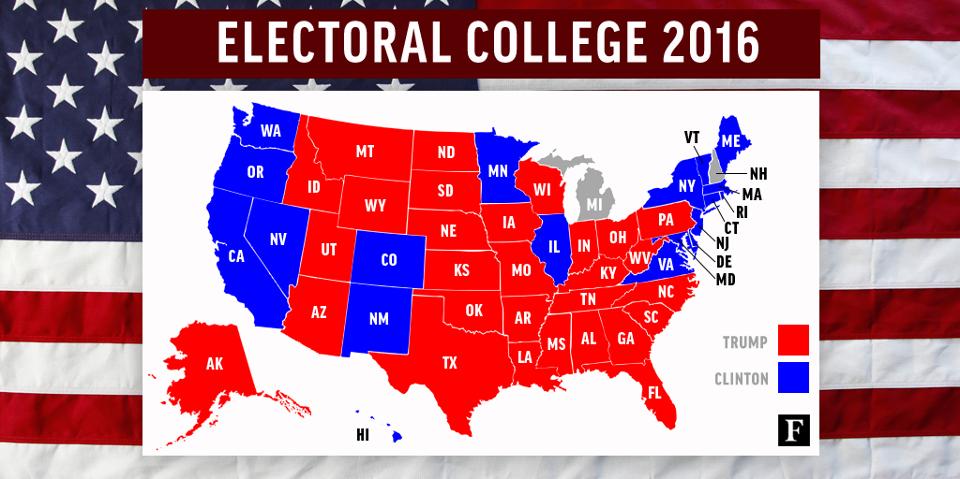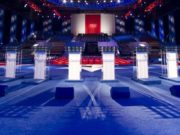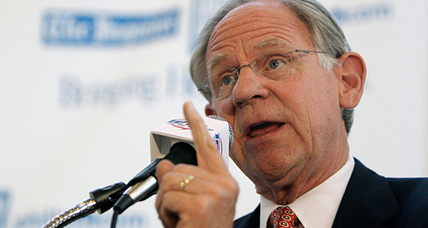The six weeks since the presidential election have seen a new phenomenon: liberals, progressives, and Democrats, and a handful of anti-Trump Republicans engaged in a series of wild efforts to convince Republican members of the Electoral College not to vote for Donald Trump, as pledged. There have been death threats, lesser threats, harassment, and sincere efforts to persuade, many of these spontaneous. But there have also been organized efforts.
For example, two Democratic electors from Washington State launched an effort called “moral electors” to persuade other electors not to vote for Trump. They later joined forces with “Hamilton electors,” a similar group that definitely spent at least some money on the effort. Harvard Professor Larry Lessig, who has run afoul of the difficult nuances of campaign finance law before, was offering free legal services to “faithless electors,” whose vote against the candidate to whom they were pledged would violate state law. A group of Hollywood actors produced a video urging Republican electors not to vote for Trump, and Unite for America, which produced the video, was sending individualized copies to Republican electors, and organizing rallies around the United States. These are just a few examples.
Now, I’m a fan of the Electoral College; I also believe that electors have a right to vote their conscience, but I believe such a right should be very sparingly used, as when, for example, the candidate to whom they are pledged dies before the College meets, or when truly new and significant information surfaces between the popular election and the meeting of the College. (And no, news that Russians may have hacked the DNC email is not new information – that was well-known before November 8.) But today, I want to write about something else – have all these efforts to sway electors violated the Federal Election Campaign Act?
I was asked about this repeatedly on a recent visit to Washington, D.C.: Are these efforts regulated by federal campaign finance laws, and, if so, have those laws been violated? The first, instant take among most campaign finance lawyers I’ve talked to seems to be “no,” because the vote of the Electoral College is not an election within the meaning of the Federal Election Campaign Act (FECA). That was my instant take, too. But on a bit of further reflection, it’s not at all clear that that is the case. Indeed, these efforts to influence the electors may indeed be subject to the Act, and thus have resulted in several potential violations.
The statutory definition of “election” in FECA (52 U.S.C § 30101) is as follows:
(A) a general, special, primary, or runoff election;(B) a convention or caucus of a political party which has authority to nominate a candidate;(C) a primary election held for the selection of delegates to a national nominating convention of a political party; and(D) a primary election held for the expression of a preference for the nomination of individuals for election to the office of President.
That wouldn’t seem to include efforts to sway the Electoral College. But let’s dig deeper.
The Federal Election Commission’s regulations (11 CFR § 100.2) define election as follows:
(a) Election means the process by which individuals, whether opposed or unopposed, seek nomination for election, or election, to Federal office. The specific types of elections, as set forth at 11 CFR 100.2 (b), (c), (d), (e) and (f) are included in this definition.
(b) General election. A general election is an election which meets either of the following conditions:(1) An election held in even numbered years on the Tuesday following the first Monday in November is a general election.(2) An election which is held to fill a vacancy in a Federal office (i.e., a special election) and which is intended to result in the final selection of a single individual to the office at stake is a general election. See 11 CFR 100.2(f).
Let’s look at that a bit more. According to the regulations, an “election” is the “process by which individuals… seek … election, to Federal office. (“Federal office means the office of President or Vice President of the United States … .” 11 CFR 100.4)
While 11 CFR 100.2 lists specific types of elections that count (“general,” “primary,” “runoff,” “caucus or convention,” and “special election”) the list does not claim to be exclusive – though this could also get complex, depending on various means of statutory interpretation, including the use of various canons of construction. But more importantly, surely getting Electoral College votes is part of the “process” by which an individual seeks election to the Presidency. After all, as we all know – and as the entire effort to sway the College proves – getting the votes of a majority of the Electoral College is a conclusive step, and getting some votes a necessary step for anyone hoping to be President. And the goal of FECA is, we’ve often been told, to prevent the corruption or appearance of corruption that results from money being contributed or spent to help a candidate get elected.
So there is a good argument, I think, that efforts to persuade electors to vote in a particular fashion are clearly covered as a “federal election.” What the heck else is the Electoral College vote? Why, in this respect, is it different than trying to influence a caucus or convention, in which delegates already elected in another election then gather to cast their votes for an actual candidate?
Again, this can be pretty complex stuff – it involves statutory interpretation and the deference given to an agency’s regulations, which normally have the force of law (for non-lawyers, this is known as “Chevron deference”). But it is certainly not far-fetched. Indeed, if this election had gone the other way, with Trump winning the popular vote, Clinton the Electoral College, and Trump supporters spending cash to urge electors not to vote for a popular vote loser, I don’t have much doubt that we’d see some liberal activists or campaign finance zealots pursuing FECA charges against Trump or his supporters. In fact, some are doing that are doing that now, anyway.
What would be some of the violations? One would be failure to report independent expenditures. Generally, you have to report such expenditures over $250, which is a very low threshold many of these groups and individuals have probably passed. Another is possible coordination with the campaign of one of Trump’s rivals. It would be illegal for any union or corporation to “coordinate” its activity with the Clinton campaign, the Stein or Johnson campaigns, or the DNC, including through agents such as Clinton campaign Chair John Podesta. Any individual coordinating such activity would be limited to spending $2,700, and that’s probably assuming they hadn’t already contributed to the Clinton campaign, which would probably count against the $2,700 limit. (Though it is possible that the FEC would consider efforts to sway the Electoral College to be a separate election, thus triggering a new $2,700 limit).
The FEC’s definition of what constitutes coordination is also complex, and there are exemptions for certain expenditures made through the internet. So there are a lot of difficult issues here, beyond the initial determination that FECA covers efforts to influence the Electoral College.
But that’s really my point. Campaign finance laws have become so complex, it is almost impossible to explain even the basics in an hour-long lecture. And one threat of this complexity is that clever political types can almost always look at the law and discover new and unprecedented ways to harass their political opponents. This is bad in any case. But it also illustrates the importance of an approach that the Republican Commissioners on the FEC have long taken, of insisting upon reasonable notice before finding “reason to believe” that an offense has been committed in cases of first impression. See Statement of Reasons, Commissioners Petersen, Hunter, and Goodman in MUR 6485, p. 2 and fn. 3. The GOP commissioners have taken a lot of flack for this from the so-called “reform” community (meaning, actually, the “pro-regulatory” or “anti-speech and participation” community, depending on how harsh one wants to be in judgment), but it’s an important if insufficient check on the abuse of these campaign finance laws.
It also points out the obvious: What is wrong with people producing a video urging electors to vote in a particular way? Why should that be restricted by law? That the video is likely to be ineffective and mainly good for pro-Trump laughs, is beside the point. Why should people have to worry about the state when expressing their political views?
Our efforts over the past 40 years to regulate campaign finance (before the mid-1970s, there was almost no campaign finance regulation) have been rather obviously unsuccessful in preventing corruption, equalizing influence, improving the quality of governance, or lifting the level of political discourse. Rather, these laws are by and large tools used to harass political opposition and limit voices that the electorate might otherwise hear. They have the odd effect of falling particularly hard on true grassroots activists, and rewarding the wealthiest candidates and campaigns. It’s really time for this First Amendment travesty to end.
Meantime, if you’ve spent money trying to persuade presidential electors to vote against Trump, and someone files a complaint against you, it appears that Larry Lessig stands ready to defend you for free. Unfortunately, if you joined together with other citizens to try to persuade the voters to oppose Trump in November, Lessig thinks the government should be able to prosecute you.
Welcome to the topsy-turvy world of campaign finance “reform.”
CCP Chairman Brad Smith was a member of the FEC from 2000-2005.














